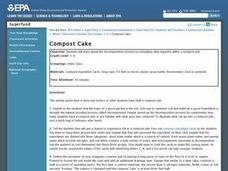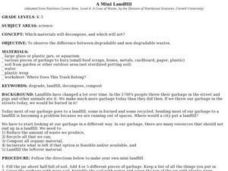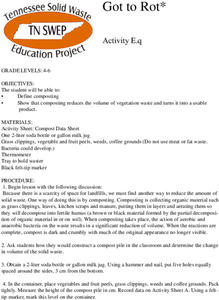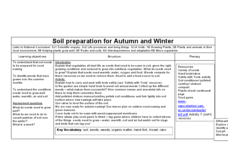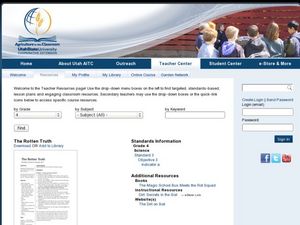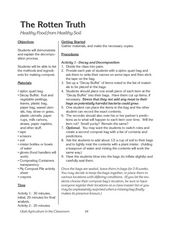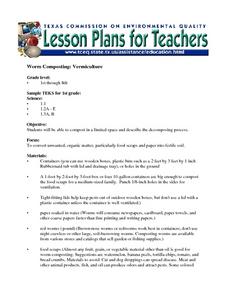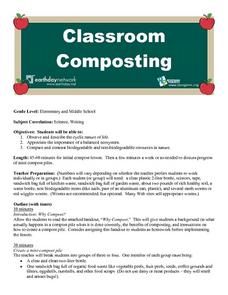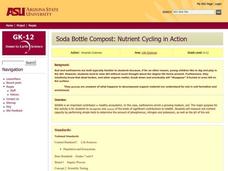Curated OER
Composting
Students survey what composting is. They observe the benefits of composting over the course of the school year by making your own composters and gardens. Group members compare two different compost piles, make conclusions about...
Curated OER
Compost Cake
Students examine the decomposition process. They create their own class compost pile and record their observations. They discover which materials decompose at a different rate.
Curated OER
A MINI LANDFILL
Students observe the difference between degradable and non-degradable wastes. They create their own landfill in a jar by adding four or five pieces of garbage and then covering it with dirt and water. They make observations on what they...
Curated OER
Got to Rot
Learners make their own compost in a 2-liter jug and determine the actual volume loss in the composted material over a six-month period.
Curated OER
Soil Preparation for Autumn and Winter
Students determine how and why soil needs to be prepared for the fall and winter seasons. In this agriculture lesson, students determine how to use gardening tools safely. They show how to work with compost material and fertilizer to...
Curated OER
The Rotten Truth
Fourth graders investigate compost. In this Science instructional activity, 4th graders take notes on the components of soil and its relation to plant growth. Students describe the steps in making compost.
Curated OER
Observing Compost Invertebrates
Second graders examine compost piles and what invertebrates help decompose the organic matter. In this compost invertebrates lesson students collect invertebrates found in a compost pile and examine them.
Curated OER
Composting in Schools: Observing Compost Microorganisms
Students explore composting. In this composting lesson, students use compound microscopes to observe the microbial communities in compost. Observations and documentation of changes will occur over the course of several weeks.
Curated OER
Researching the Nutrient Cycle
In this researching the nutrient cycle worksheet, students read about the cycle of nutrients, look at the diagram, then answer two questions by doing research on this topic.
Curated OER
Composting Leftovers
In this composting leftovers instructional activity, students set up an experiment with food waste and soil, observing and recording the differences for two weeks.
Curated OER
Collecting Compost
Students observe a composting box. For this soil lesson, students create a composting bin by using a bin, newspaper, worms, and food scraps. Students create a composting food web.
Curated OER
The Rotten Truth: Healthy Food from Healthy Soil
Learners investigate methods of decomposition in order to make compost. In this decomposition science lesson, students set up compost bags using food and materials which decay over time. The initial lesson is approximately 30 minutes,...
Curated OER
Let's make a landfill
Young scholars create a mini-landfill. For this decomposing lesson, students differentiate between materials that decay from those that won't. Young scholars identify the factors that might help materials from decomposing. Students...
Curated OER
Composting
In this composting worksheet, students read an informative paragraph about composting and then respond to 7 short answer questions regarding the topic.
Curated OER
Recyclers Revisited
Fifth graders observe their plant experiments that they started in a previous lesson and examine the role of decomposers in the nitrogen cycle. Two weeks after they set up a worm terrarium, they analyze any changes they observe, and...
Curated OER
Are you going to eat that?
Students identify and define composting. STudents compare and contrast aerobic and anaerobic composting. Students illustrate the benefits of composting and other methods to reuse, recycle, reduce, and respond. Students identify through...
Curated OER
Making Your Own Sampling Tools
Young scholars examine cause-and-effect relationship between human attitudes and behavior in the environment. They also assist citizens in increasing their sensitivity and stewardship for the environment.
Curated OER
Recycling by Composting
Young scholars examine the idea of recycling by composting. Using the internet, they research the benefits of composting to the environment. In groups, they collect numbers on how much food and yard waste is produced in their...
Curated OER
Sustainable Agriculture
Students perform an experiment to find out if plants grow best when grown in soil with no fertilizer, with chemical fertilizers, or with compost that they have made themselves. Students discover how agriculture practices can benefit the...
Curated OER
Worm Composting: Vermiculture
Students set up their own composting bin. They observe and record their findings during a period of time. They describe the decomposing process as well.
Curated OER
Composting
Students discover the concept of decomposition. They examine how it makes the soil more fertile and how it helps plants. They put a compost bin in their backyard and record their observations.
Curated OER
Classroom Composting
Students discover the benefits of composting. They identify the steps of decomposition as well. They are read a book and discuss what items decompose.
Curated OER
Soda Bottle Compost: Nutrient Cycling in Action
Students investigate, through their own experimentation, the important role wildlife play in nutrient cycling. Earthworms and compost are used in this experiment and different experimental setups be evaluated.
Curated OER
What a Waste
Pupils analyze components of garbage. They collect and sort a few days' worth of garbage. They chart the results of an investigation.



